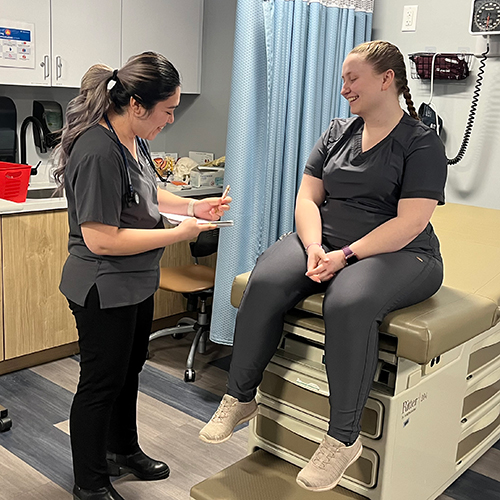Earn a degree and become a medical assistant
| Accreditation | Accredited by the Higher Learning Commission |
|---|---|
| Transfer credit | Transfer up to 45 approved credits |
| Format | Online classes + hands-on clinical labs & externship |
| Certification | Prepare for the Registered Medical Assistant (RMA) certification exam – we pay for your first attempt! |
| QuickPaths | Advance your education in allied health with many options at the bachelor’s degree level, including health sciences or healthcare administration |
Learn More Today!

Satisfaction rate
Our overall student satisfaction rate, according to the 2024 Herzing Graduate Survey.
Associate of Science in Medical Assisting Services
The Associate of Science in Medical Assisting Services degree is a 60-hour undergraduate program which prepares you for a career as a medical assistant.
The online degree program provides students with fundamental knowledge and skills in medical terminology, pathophysiology and pharmacology, insurance claims, patient privacy, billing and coding, and much more.

Career-focused curriculum
Discover the crucial knowledge and skills required to succeed in your work and build a foundation for continued career growth.
Flexible schedule
You can take classes during the day or in the evening. We work hard to help you maintain school-life balance, striving to be as flexible as possible for busy non-traditional students.
Virtual services
Access to extensive virtual services, including academic advising, tutoring, support services, technical support and library services.
Lifelong support
We support your ongoing career advancement by providing comprehensive, personalized student services with lifelong career coaching.
Rolling admissions
No application deadlines to worry about. Apply when you’re ready and prepare to get started soon.
Medical Assisting associate degree classes & curriculum details
Our associate degree program builds upon our diploma in medical assisting, introducing students to the overall operation of a physician’s office. You’ll be trained in basic clinical and administrative tasks including exam room assistance, routine lab procedures, handling financial records, insurance forms and more. You will prepare for and sit for the Medical Assisting Certification Exam as part of the program.
All classes are delivered online. The curriculum also includes hands-on clinical experience and an externship.
| Program | Months i | Semester Credits |
|---|---|---|
| Associate of Science in Medical Assisting Services | 16 | 60 |
i. Average number of months for students to complete the program attending full-time
Required Courses
All courses, 24.00 semester credit hours, are required.
Required Clinical Courses
All courses, 13.00 semester credit hours, are required.
* Enrollment and successful completion in a student readiness training course is required two terms prior to MS 263 and MS 268.
Healthcare Elective Courses
A minimum of 2.00 semester credit hours is required from a combination of healthcare electives and/or credits transferred from the core (non-general education) courses of a healthcare-related associate or diploma programs. Students not transferring in 2.00 semester credit hours in healthcare courses may make up the difference with elective courses in healthcare and/or related subject areas.
General Education Requirements - Associate
Students enrolled in this program must complete a minimum of 24.00 semester credit hours in general education distributed among the following disciplines. 9.00 Semester Credit Hours in Communications EN 104 – English Composition I EN 111- Information Literacy EN 116 – Speech 6.00 Semester Credit Hours in Humanities HU 140 – Cultural Diversity HU 240 – Introduction to Humanities 3.00 Semester Credit Hours in Mathematics MA 109 – College Algebra 3.00 Semester Credit Hours in Science SC 144 – Introduction to Anatomy and Physiology* 3.00 Semester Credit Hours in Social and Behavioral Sciences PS 101 – Psychology *This requirement is being met by the programmatic science course requirement, SC 144, above.
Tuition & Cost
Tuition & Cost
The cost of tuition for the Associate of Science in Medical Assisting program is $530 per credit.
You can potentially earn even greater savings by transferring credit from prior college coursework, applying for financial aid, or potential partnership opportunities through your employer.
Our goal is your career advancement. That's why we are always working to improve our curriculum and processes to make our program as affordable as possible while preparing you best for success in your work.
Scholarships & Financial Aid
You may be eligible for multiple scholarships and grants, both through Herzing University and several national scholarship websites.
Military/Veteran Discounts
Veterans, Active Duty U.S. Servicemembers, and spouses may qualify for a 10% tuition discount or tuition reduction to $250 per credit.
Medical Assisting associate degree enrollment requirements
Prerequisites to enroll in the Herzing University Medical Assisting associate degree program include:
- Completion of a high school diploma, GED or equivalent
- Meet and interview with a Herzing University admissions advisor
- Complete an enrollment application
- Alabama
- Alaska
- Arizona
- Arkansas
- California
- Colorado
- Connecticut
- Delaware
- District of Columbia
- Florida
- Georgia
- Hawaii
- Idaho
- Illinois
- Indiana
- Iowa
- Kansas
- Kentucky
- Louisiana
- Maine
- Maryland
- Massachusetts
- Michigan
- Minnesota
- Mississippi
- Missouri
- Montana
- Nebraska
- Nevada
- New Hampshire
- New Jersey
- New Mexico
- New York
- North Carolina
- North Dakota
- Ohio
- Oklahoma
- Oregon
- Pennsylvania
- Rhode Island
- South Carolina
- South Dakota
- Tennessee
- Texas
- Utah
- Vermont
- Virginia
- Washington (AS only)
- West Virginia
- Wisconsin
- Wyoming
- The Virgin Islands
Clinicals
Clinicals: how the associate degree program works
Clinical Labs
Two terms prior to the externship, you will be required to take two clinical courses. Most coursework will be completed online, but you will also be required to meet with a proctor at a healthcare facility (possibly a Herzing campus) to demonstrate mastery in medical assisting skills. Prior to your labs you will need to take and pass a Student Readiness Training (SRT) proctorship. You must complete a Basic Life Support (BLS) CPR class from the American Heart Association or the American Red Cross as part of the requirement.
Externship
You will complete 180 hours at a medical clinic or doctor’s office in an eight-week period during your final term—Monday-Friday during daytime hours. Depending on the requirements of your externship site, expect about 25-40 hours per week. Herzing’s clinical coordinator can assist you in your search, but it will be your responsibility to locate and secure a proctor and externship site in your geographic area during your Student Readiness Training Seminar (SRT).
Finding a proctor for your clinicals. Herzing’s Proctor Prep SRT seminar provides guidance on how to search and secure a proctor to assist in your clinical courses. This course is usually scheduled two terms before the first clinical course. In order to succeed, you’ll need to be in frequent communication with the SRT instructor. You will have access to a clinical coordinator who will assist in your search, but ultimately it is your responsibility to secure proctorship.
Contact us and we can provide answers to any further questions you have about the clinical/externship component of the medical assisting program.
Your rewarding career path in medical assisting



Medical assisting offers you an entry point into your unique career path in healthcare. In less than 2 years you can earn an associate degree in medical assisting, find your first job and position yourself to advance your career in the future.
As a medical assistant you’ll be charged with variety of many different types of tasks in either clinical or administrative roles (or both, depending on the size of the institution), including drawing blood, taking vital signs, scheduling appointments, preparing exam rooms and communicating with patients and other medical personnel.
Medical Assistant Ranked #5 Best Health Care Support Jobs of 2025 by U.S. News & World Report
You will become a key contributor in a healthcare institution and learn what it takes to succeed as part of a medical team. This can be a greater next career step for those looking for go from CNA to MA.
Seeking a job in an office environment? Students interested in pursuing a role exclusively working in administration might prefer to pursue an associate degree in medical office administration. You’ll be able to focus your study developing the knowledge and skills necessary to succeed in a medical office.
Job Outlook
According to the Bureau of Labor Statistics, employment of medical assistants is expected to increase 13% from 2024-2034, much faster than the average across all U.S. occupations.*
It’s a great time to begin earning the education you need to join this rapidly growing field, become an MA, and build a strong foundation for a career in healthcare.
Waived Enrollment Fee
Discover the educational pathway designed to maximize your career potential. Reach for greater heights with Herzing University.
Faq
Frequently Asked Questions
Didn't find the answer to your question? Send us an inquiry and we will be happy to answer all your questions!
With Herzing University, an affordable, career-focused education is within your reach. We are always striving to make college more affordable for everyone.
- Student loans & secured loans. Loans offer a way to pay for all or part of your tuition.
- Scholarships. We offer a variety of scholarships based on academic achievement, financial need or community affiliations. Contact an admissions advisor about current scholarship opportunities by calling 1-800-596-0724 or request for information online.
You can find an estimate for grant and scholarship aid using the net price calculator, and find an estimate for tuition for the online medical assisting program using Herzing University’s tuition wizard.
According to the Bureau of Labor Statistics (BLS), medical assistants earn an average salary of $44,720 per year ($21.50 per hour).* As you earn more experience and gain more skills, your earning opportunity will improve.
The BLS also projects growing demand for medical assistants in coming years, predicting an 13% increase in employment from 2024-2034. It’s a good time to get your foot in the door and work towards your new career.
Considering your career options in healthcare? Here are a few other types of jobs where you can potentially get off to a fast start:
- Medical Records Technician. Medical records technicians are responsible for the recordkeeping of confidential patient information. These types of jobs have no responsibilities in clinical care.
- Medical Billing and Coding. Billers and coders focus on healthcare revenue cycle management, concerned primarily with how patients and insurance companies are billed for healthcare services. These professionals do communicate with patients (most often medical billers) but again, play no role in clinical care.
- Certified Nursing Assistant (CNA). CNAs, on the other hand, do not play a role on the administrative side. They work exclusively in patient care, helping patients get dressed, bathe/shower, move from beds to wheelchairs, or eat meals. CNAs more often perform tasks needed around the clock, so hours/shifts in these positions can be less predictable.
- Licensed Practical Nurse (LPN). LPNs have a different scope of practice than medical assistants, focusing more directly on patient care under the supervision of an RN or physician. This represents a more direct career path into nursing. Learn more about the difference between medical assistants vs. LPNs.
- Dental Assistant. Dental assistants also perform one or a mix of clinical and administrative tasks, but only in regard to dental care.
Because medical assistants can wear so many different hats there are many important skills needed to thrive in different healthcare environments:
- Professionalism. In many positions you will need to handle customer service tasks, basic patient care and clearly communicate physician information to patients. Medical assistants must demonstrate professionalism and tact when interacting with patients.
- Attention to detail. Medical assistants may gather patient contact or insurance information and keep medical records organized. You must be meticulous and highly detail oriented to succeed.
- Compassion. Making patients comfortable and empathizing with their concerns is crucial ensuring patients are calm and collected for medical procedures.
- Multi-tasking. Staying organized and measured in the face of quickly changing circumstances and a lengthy “to-do” list will make you indispensable to a healthcare team.
These are just a few key medical assistant skills that will help you excel in medical assisting and beyond to many other career opportunities in healthcare.
According to the Bureau of Labor Statistics, these are the most common places of employment for medical assistants:
- Physician’s offices
- Hospitals
- Offices of other health practitioners
- Outpatient care centers
- Retirement communities / assisted living
A career in medical assisting involves a diverse array of roles and responsibilities. Depending on the practice you work for and department you are in, your normal everyday tasks can vary widely.
Potential tasks include (but not limited to):
- Answering the phone and greeting patients
- Informing physicians about patient concerns
- Scheduling appointments
- Gather patient information: contact info, insurance info, etc.
- Measuring patient vital signs
- Taking blood pressure, pulse and respirations
- Setting up exam rooms for procedures
- Visual and hearing tests
- Drawing blood
- Pregnancy tests
- Making patients comfortable during an appointment
No matter what’s required in your day-to-day experience on the job, what ties everything together is your professionalism, care for patients and attention to detail. Your resourcefulness will make you a valuable resource in a fast-paced healthcare environment.
Read more about a typical day in the life of a medical assistant and what you can expect after getting a job in the field.
Your choice depends on the career path you’d like to pursue.
If your number one priority is finding a job as a medical assistant as quickly as possible, a diploma program may be a better choice. You can earn a diploma in a year or less when attending full-time and be ready to enter the workforce as a certified medical assistant.
If you envision medical assisting as step one on a long career path in healthcare, you may prefer to choose the associate degree program. In addition to core medical assisting courses, you will take general education classes you can transfer into a bachelor’s degree program in the future. Baccalaureate options for medical assistants include healthcare administration, health sciences and health information management. Earning an associate degree will likely only take a few months longer and position you very well for the next step in your education.
Medical assistants can hold a variety of titles, roles and responsibilities based on the employer. There are two broad types of medical assistants:
- Clinical medical assistants. These medical assistants focus on patient care, including taking vital signs, drawing blood, visual/hearing tests, preparing exam rooms for procedures, communicating with physicians, and much more. Our medical assisting program is designed for students seeking these kinds of roles working directly in patient care.
- Administrative medical assistants. Sometimes referred to as “front office medical assistants,” administrative assistants handle scheduling, patient records, insurance claims and additional accounting/billing tasks to help the delivery of healthcare run smoothly. These types of medical assistants can specialize their education in a medical office administration program.
Experienced medical assistants, particularly on the clinical side, may specialize in a certain type of care or age group, such as pediatrics, obstetrics, cardiology, orthopedics, or many others.
How long it takes to become a medical assistant depends on what level of education you pursue. Partner with Herzing University and you can expect a range of 10 months–20 months to get your education, get certified and start looking for a medical assistant position, depending on whether you choose a diploma or degree program.
The following timelines are based on full-time status:
- Associate degree: 20 months
- Diploma: 10 months
After earning your degree or diploma, we recommend becoming certified as a Certified Clinical Medical Assistant (CCMA) even if it isn’t required in your state. With a diploma/degree and a certification, you’ll be positioned well for your first job.
Beginning your career as a medical assistant is a great way to build a strong foundational education in healthcare, gain meaningful real-world experience and prepare yourself to continue growing professionally.
What is the next level after medical assistant? It depends on your strengths, preferences and overall career goals in healthcare.
Many fields in healthcare are potential landing spots for medical assistants looking to specialize or branch into a new career path, including healthcare management, health information management, nursing (you may consider going from medical assistant to RN), and more.
Herzing University offers many degree and diploma programs for practicing medical assistants to take a leap and embark on a new career path. Our health sciences degree program is designed to help you complete your bachelor's degree and advance your career to the next level.
Program Finder
Associate Degree in Medical Assisting Services
On Campus OnlineTo learn more about this program, click the Request Info button.
The Student Experience at Herzing
I have always wanted to help people, and a career in healthcare is a great way to do that. Herzing University inspired me to work towards my dream and they were there for me every step of the way. They helped me find a schedule that worked for me and gave me all the information I needed to be successful.
Tiffany Norfleet
Healthcare Student | Online CampusWhile school can be challenging, having a team behind you like the one at Herzing can help so much!
Kanaria Brown
Healthcare Student | Online CampusThe program provided a great balance and left me feeling confident!
Brianna Beal
Healthcare Student | Online CampusI have always wanted to be a medical assistant and Herzing University worked with me to get my degree. My teachers and the Herzing staff were very understanding and helped me stay up on my coursework even though I faced challenges.
Nakiya Moore
Healthcare Student | Online CampusIf you’re looking to study at Herzing, do it. Once you get started you won’t regret it!
Savannah Nelson
Healthcare Student | Online CampusIt was simultaneously the hardest and most rewarding experience of my life.
Shambretta Johnson
Healthcare Student | Madison CampusAccreditation & Disclosures
1. Certification in this program is not a state requirement.
Herzing University is accredited by the Higher Learning Commission (hlcommission.org), an institutional accreditation agency recognized by the U.S. Department of Education.
Recent Blog Posts
Waived Enrollment Fee
Discover the educational pathway designed to maximize your career potential. Reach for greater heights with Herzing University.







